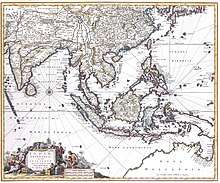
Back نظام جديد (إندونيسيا) Arabic Orde Baru German Uus Kord (Indoneesia) Estonian Uusi järjestys Finnish Orde Baru ID Orde Baru JV 신질서 (인도네시아) Korean Orde Baru MAP-BMS Orde Baru Malay Orde Baru NDS
| New Order | |||
|---|---|---|---|
| 1966–1998 | |||
 | |||
| Location | Indonesia | ||
| Including | Acting presidency of Suharto | ||
| Leader(s) | Suharto | ||
| Key events | |||
Chronology
| |||
| History of Indonesia |
|---|
 |
| Timeline |
|
|
The New Order (Indonesian: Orde Baru, abbreviated Orba) describes the regime of the second Indonesian President Suharto from his rise to power in 1966 until his resignation in 1998. Suharto coined the term upon his accession and used it to contrast his presidency with that of his predecessor Sukarno (retroactively dubbed the "Old Order" or Orde Lama).
Immediately following the attempted coup in 1965, the political situation was uncertain, and Suharto's New Order found much popular support from groups wanting a separation from Indonesia's problems since its independence. The 'generation of 66' (Angkatan 66) epitomised talk of a new group of young leaders and new intellectual thought. Following Indonesia's communal and political conflicts, and its economic collapse and social breakdown of the late 1950s through to the mid-1960s, the "New Order" was committed to achieving and maintaining political order, economic development, and the removal of mass participation in the political process. The features of the "New Order" established from the late 1960s were thus a strong political role for the military, the bureaucratisation and corporatisation of political and societal organisations, and selective but brutal repression of opponents. Strident anti-communist, anti-socialist, and anti-Islamist doctrine remained a hallmark of the presidency for its subsequent 30 years.
Within a few years, however, many of its original allies had become indifferent or averse to the New Order, which comprised a military faction supported by a narrow civilian group. Among much of the pro-democracy movement that forced Suharto to resign in the 1998 Indonesian Revolution and then gained power, the term New Order has come to be used pejoratively. It is frequently employed to describe figures who were either tied to the Suharto period, or who upheld the practises of his authoritarian administration, such as corruption, collusion and nepotism (widely known by the acronym KKN: korupsi, kolusi, nepotisme).[1]
- ^ Stop talk of KKN Archived 26 October 2014 at the Wayback Machine. The Jakarta Post (24 August 2001).